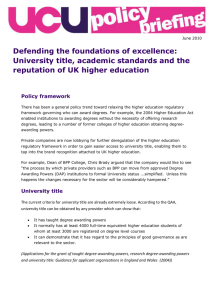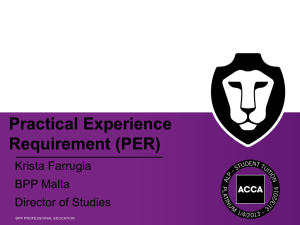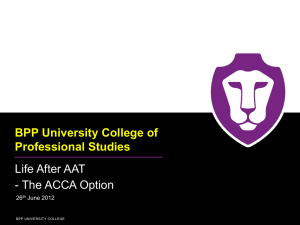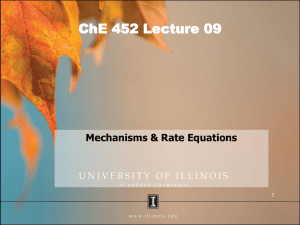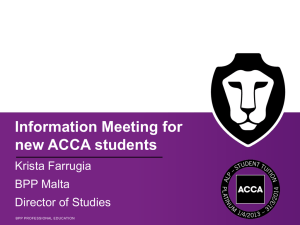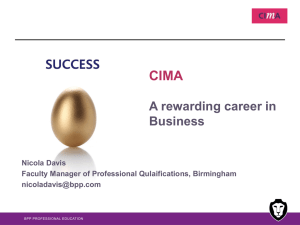Carl-Lygo
advertisement
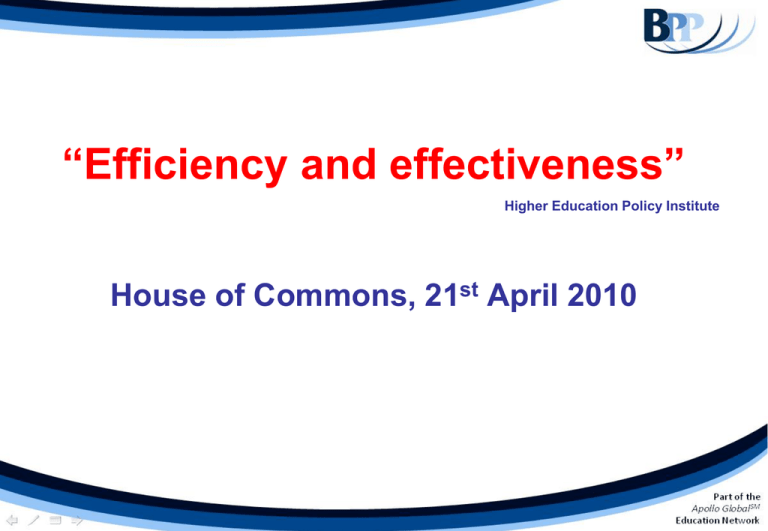
“Efficiency and effectiveness” Higher Education Policy Institute House of Commons, 21st April 2010 Introduction • Carl Lygo – Chief Executive, BPP Education Group and Principal BPP College of Professional Studies (BPP Business School, BPP Law School) – Barrister – Worked in the publicly maintained university sector (8 years) and with BPP Education Group for 13 years • Why I’m here – To give a non-traditional HE perspective – How private sector universities differ from the publicly maintained university sector 2 BPP Education Group BPP formed in 1976 by three accountancy faculty to provide home study and flexible training for the finance sector Floated in 1986 as BPP Holdings plc In 2007 BPP became the first proprietary company to gain UK Degree Awarding Powers Also in Ireland through BPP Professional Education Also in Holland through Markus Verbeek Praehep/Markus Verbeek Business Academy 140,000 clients studying with BPP annually BPP College of Professional Studies (BPP Law School, BPP Business School) BPP Professional Education (BPP Learning Media) Mander Portman Woodward (private schools group 14-18) 3 BPP Education Group In 2009 became a wholly owned subsidiary of Apollo Inc £306 million acquisition (BPP t/o £165 million, 99.8% from private clients) BPP Professional Education BPP Business School BPP Law School 4 BPP Learning Media Apollo Education Network • University of Phoenix (US) – – – – – • • • • • • John Sperling established 1973, on-line commenced in 1989 458,600 students (as at Q2 Earnings announcement 2010) 7,500 doctoral students 1 enrolment every 20 seconds 66% female students College for Financial Planning (US) Institute for Professional Development (US) Western International University (US) Meritus University (Canada) Universidad de Artes, Ciencias y Comunicación “UNIAC “ (Chile) Universidad Latinoamericana “ULA” (Mexico) 5 The UK “private sector” • Private providers who exercise degree awarding powers of the publicly maintained sector (e.g. Kaplan International Colleges) • Private providers who support the operations of the publicly maintained sector (e.g. INTO, Cambridge Education Group, Study Group) but have no degree awarding powers • Providers in the UK with degree awarding powers but who are charities governed by public law – some of which operate a thin line in relation to the “public benefit” test – enjoying tax breaks but have none of the controls built into the publicly maintained sector • What’s left? • BPP College of Professional Studies – degree awarding body – the only private sector provider of degree education in the UK 6 Governance • Academic Council – Educational authority of BPP – Voting majority weighted in favour of Independent Members – Chaired by Professor Martyn Jones, PVC of Kingston University – 6 independent members, 2 from “industry” (1 QC, 1 from Business), 4 from the higher education sector • Board of Directors – Faculty led commercial board including Deans of Schools – Non-executive director • Ceremonial President: Baroness Cohen of Pimlico • Executive – Principal, CEO – Deans of Schools (Business, Law) – Chief Officers for operating roles – Finance, Technology, Operations, Marketing, Enrolment, People 7 Private Sector BPP Model UOP Model • Learning Centres in 14 UK Cities and 13 in other European countries • Face to Face learning • Blended learning • New to on-line • Blackboard/Moodle/others • Class sizes typically 12-18 • 12-16 hours contact pw (clients) • 95% faculty permanent employees (16 hours max for 2 semesters) • Centralised programme development • 3 standard “start dates” for degree programmes • Learning Centres in 40+ States, 200 Campuses • Ground campus learning • On-line learning • Bespoke e-learning platform • Moving between modes • Class sizes average 15 • Large freelance faculty from industry/other Universities • Centralised programme development • Weekly “start dates” for degree programmes 8 Faculty • Employed permanent employees • 37.5 hours per week contract • 30 days holiday per year plus bank holidays etc plus discretionary closure days (employee can flex holidays by buying/selling up to 10 days) • Career levels of Lecturer, Senior Lecturer, Principal Lecturer, Professor linked to HE Academy descriptors with appointments panel • Typically 16 hours max teaching per week for two semesters • Salaries usually higher than the publicly maintained sector • Not part of the University Pension fund 9 Other services • • • • • • Academic registry led by the Academic Registrar Quality Assurance & Enhancement embedded Pro bono – award winning pro bono service (04,05,07 and 09) Careers service Library – both physical and on-line Student accommodation – use of third party private sector suppliers (UNITE etc) • Student societies (sporting, cultural, political, spiritual etc) 10 BPP Approach • • • • Uncomplicated management structure Learning and Teaching led Service culture Focus on the client – Supporting career development – Practical, professional and relevant – Constantly re-evaluating and testing what the client needs • Employer engagement – Invest a lot in understanding what the employer wants – Employ professionals from the employer base • Rigorous standards – High professional standards – we expect a lot 11 Financial value of education Source: LSE study quoted Evening Standard 04/03/10 12 Confirming similar data in UUK/PWC 2006 report “The economic benefits of a degree” Wage premium of relative degrees Source: CIPD “Value of Degrees Survey 2006” 13 *Future Fit (2009) “Employability Skills” CBI/UUK* defined as: • Self –management – readiness to accept responsibility, flexibility, resilience, self-starting, appropriate assertiveness, time management, readiness to improve own performance based on feedback, reflective learning • Team working - respecting others, co-operating, negotiating/persuading, contributing to discussions, awareness of interdependence with others • Business and customer awareness – understanding the drivers for business success – including the importance of innovation, taking calculated risks, the need to provide customer satisfaction and to build customer loyalty • Problem solving – analysing facts and situations, applying creative thinking to develop appropriate solutions • Communication and literacy – ability to produce clear, structured written work, oral literacy, including listening and questioning • Numeracy – general mathematics awareness and its application in practical contexts, confidence tackle maths problems in the workplace • Application of information technology – IT skills including word processing, spreadsheets, file management, and use of internet search engines 14 How well do Universities prepare students? 15 “33% of graduating students wish they had chosen a different course such as a more scientific/technical course or a business based course or a professional vocation” Source: CIPD “Value of a Degree” 2006 16 Change is inevitable UK Economy – “For over a decade we have piled deficit upon deficit, mortgaging our children’s future for the convenience of the present” – A crisis that will get worse for future generations – “The UK is awash with debt – corporately, personally and at the country level. The country will hit 100% of GDP in interest-bearing debt somewhere round about 2014” Jon Moulton – “You and I, as individuals, can, by borrowing, live beyond our means, but only for a limited period of time. Why, then, should we think that collectively, as a nation, we’re not bound by that same limitation?” 17 Change is inevitable UK Funding for HE – The current funding model for Universities is older than the NHS – Price Waterhouse Cooper study shows that 41 Universities ran deficits through the “boom years” 2004-2008 – Some universities have contingencies for only 12-14 days operation – 1 University is already spending next year’s HEFCE hand out to pay salaries – Mergers have not necessarily been the answer (London Met) – More radical cuts in funding are on their way - Institute of Fiscal Studies (a further £1.6 billion by 2013) 18 Full-time job servicing others and chasing public funding • • • • • • • Ministerial team 58 educational quangos 7 research councils 23 sector skills councils 30 Lifelong Learning Networks Professional Bodies/Institutes Employers/Clients 60% of funding from the public purse 40% from the employer/students UK is below the OECD average on HE expenditure as a % of GDP and the 9th lowest country for the amount of private spending on HE 19 Abandoning the 50% participation target ? • No – how can a knowledge economy compete? • Last year record numbers of UK applicants were turned away from University, this year it could be even worse • UK university graduation rates for young people graduating with a first degree is below the OECD average* • 30% of the total UK work force have a graduate level qualification • The % of 15-19 year olds NOT in education or employment in the UK is the 2nd highest of all the 29 OECD developed countries, only Turkey is worse* • The UK is below the OECD average for developed nations in terms of the % of population completing upper secondary education* *Source: OECD 2009 At a Glance Data: Education Directorate 20 The future? • BPP offers undergraduate degrees at the top up level fee – BPP neither receives nor asks for any funding from HEFCE – BPP’s model involves 12-16 hours contact teaching per week in maximum class sizes of up to 18 – Degree can be completed in 2-7 years (BPP teaches through the summer term) – Professional employed faculty teaching professionally relevant degree programmes – “subsidies should go to those most in need” (CBI Proposal) – “Government needs to welcome greater private sector involvement in the sector provided it delivers high-quality provision and value for money” (CBI proposal) “Stronger Together: Business and Universities in turbulent times” 2009, CBI • Here to stay! 21
